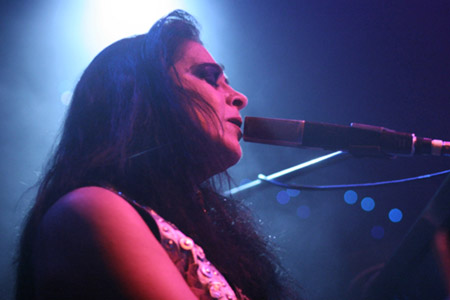
Documenting the complexities and oftentimes illogical variations of love is certainly no enviable task for any artist, no matter how formidable. "Imitation of Life," Diamanda Galas' song cycle based on the "thrill and pain of romantic love," however, finds one such artist capable of confronting the endless variations of this most primitive of experiences with the profound fervor and conviction that it demands. Throughout the evening at the Highline Ballroom, the invested subtleties and extremes of this subject were interpreted and projected with the virtuosic reach and power we have come to know and love her for.
Entering quietly in the darkness, she sat behind the lone piano occupying the stage. With a flick of her black mane and the glinting of a cued light off her glitter-dusted eyelids, she proceeded head-on into "A Soul That's Been Abused" by striking out a set of slow, sforzando chords. With each gesture at the piano, her face and body responded, emphasizing the fury by which she engaged her instrument. Shifting effortlessly from lovelorn to disgusted to dismayed, she attacked every word in the manner that only she can, her arms dropping to her side during a passage of the arrangement in order to fully address the series of vocal explosions that tore themselves un-mercilessly from her body. Witnessing this physical navigation of her delivery is as equally engaging as the result, with her entire body resonating under the weight of emotive strain. This is not a series of "for effect" hand flutters; it is self-induced exorcism.
The Juliette Greco staple “Amours Perdues” manifested itself beautifully with Diamanda’s gentle vocal glissandos rolling out across the carpet of blue light projected beneath her. It is not to say that I don’t love every well-honed extreme technique that she is capable of, but I just as thoroughly admire her restrained approach. Especially because I can tell everyone who has ever thought her incapable of vocalizing in this manner, “Up yours, I told you. She is a musician first and foremost, learn it.” Equally stunning was her delivery of “You Don’t Know What Love Is.” Introduced with rumbling chord and note dynamics and then alternating to a gentle tinkling of piano keys, her voice rose forth colored with an unabashed plaintiveness and longing. It was one of the high points assuredly, absolute in its understated effectiveness.
The Rembetika “Keigome Keigom” (I’m Burning, I’m Burning) raged forth with the intensity and full sum of fury and gutteral wailing that she is capable of projecting in a cleansing ritual of pain and betrayal. Following an opus of this magnitude is no easy task, but the challenge was duly met with a thunderous and deep reaching delivery of “8 Men
and 4 Women.” Every second was breathtaking, with her encircled by blue vertical lights as if placed in her own Parthenon adding to the drama. The space resounded with thunderous piano while her voice descended into harsh, throat-driven passages in a preemptive assault to the main verses of the composition. Really, I can think of no other present artist capable of doing justice to O.V. Wright quite as effectively as Diamanda. A vocalist needs to dig deep on this one; it demands no inhibition or posturing, and she is thoroughly qualified, make no mistake about it.
Working her way through a volcanic “You’re My Thrill,” she stamped her feet and tossed her black mane about, fingers nimbly trailing across the piano keys fully embracing and possessed by the devotional theme of the lyric. Her voice rose as a swirling vortex at times and then focused in others as if it were being strangled, collapsing into gasps. She grabbed this one by the balls baby, because you know she can mix it up with the best. She proceeded into “Autumn Leaves,” the lyric dissolving beneath the intensity of her every gesture, transforming into mere hallucinations of their former selves. “Le Chanson Des Vieux Amants” followed, seeming to hang in the air motionless and aching, captured by the red-lit stage.
Ending the main body of the performance with a somber and weighty rendition of “Heaven Have Mercy” that was every ounce as exquisite as Piaf herself would have done, rest her soul, Diamanda promptly stood from her piano and exited. Cheers, shrieks, and applause immediately followed, and she graciously responded with her first encore, “The Thrill is Gone.” I have seen her perform this several times before, but this was the most devastating version I have thus been witness to. It was distinctly somber, moving forth like a funeral procession to the grave.
She returned for a second encore after once again leaving the stage to furious applause and howling, closing out the evening with what has become a signature of hers, if you will, “Gloomy Sunday.” She, of course, performs the Desmond Carter translation, as if we would have it any other way, ensuring that as an audience we are left haunted by
every phrase, tone, and timber that emanates from the stage. Leaving for the final time with a bow in the darkness, the house lights come up, letting us know that we must once again wait some time before we share another moment with our diva of choice. Well, at the very least, mine, though I do feel that drag queen sharing the bathroom with me might have given me some competition in proving who has the greatest adoration of her. She was truly fierce, and as Diamanda surely knows, you never get into it with a drag queen because they will own you.
[Photo: Paula Court]